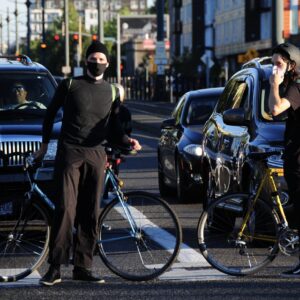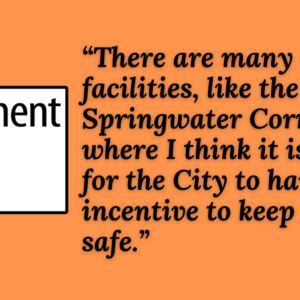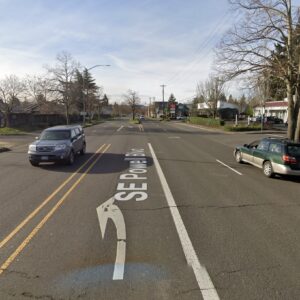What should you do if you are in a collision with a motor vehicle? First, be prepared. While the odds may be pretty good that you will never be involved in a collision there are several tips you can follow which will make any collision less of a disruption in your life. An understanding of the fundamentals of insurance, medical services, and the legal system will help you after your collision.
This article is a very basic primer on these areas.
If you do get in a collision with an automobile while riding your bicycle, make sure that you obtain complete and accurate information about the driver. It is an unfortunate fact of modern life that some people with driving and insurance problems carry false identification. Make sure that the driver shows you an official document such as a driver license or other photo ID as well as a certificate of current insurance coverage before they leave the scene of the collision. If they will not do so, then call the police.
Many people think that calling the police will result in investigation and preparation of a police report. However, unless it is apparent to the responding police that there has been an injury in the collision they will usually not prepare a report, but instead will merely assist in an exchange of information. Many serious injuries are not visible at the scene of a collision when the injured person’s adrenaline is flowing and there is the usual confusion about what to do next. If possible, return to the scene or send a friend with a camera and take photographs of skid marks, glass, or marks on the road showing point of impact, direction, speed, or force. Try to document what the conditions were like and how the collision happened.
Time after time, I have seen clients outraged and disappointed when a person who freely admitted to being at fault at the scene later changed his or her story in an attempt to shift fault to the bicycle rider.
If you have any question at all about whether or not you are injured, you should immediately go to an emergency room or get in to see your regular doctor. Many internal injuries, including closed head brain injuries, as well as soft tissue neck and back injuries are not fully appreciated by the injured person until some time has passed since the collision. It is important that you document your injuries so that later, if need be, you can show through proof from a medical person that your injuries were caused by the collision.
Most people do not realize that their automobile insurance policy also covers them while they are riding a bicycle. This is important as “insurance consumers,” because everyone who has an automobile insurance policy is paying part of each premium dollar toward coverage that will apply if the insured person is injured while walking or riding a bike.
For example, if you are hit on your road bike by an uninsured drunk driver one afternoon while you are on a training ride and seriously injured, it is important to realize that your own automobile insurance will provide two types of coverage for you. First, Personal Injury Protection (PIP) will pay for your medical bills and loss of income. PIP is a part of your own policy and will apply in every bicycle collision regardless of whether or not the other person is insured, and regardless of whose fault caused the collision. It is “No fault” coverage. “No fault” means that even if a collision is your fault, PIP protection will cover you. Even if you have no car insurance because you are not a car owner, you may be covered by the car insurance policy for your parents or your employer.
The second type of applicable coverage is Uninsured Motorist Coverage (UM), a legally required part of every automobile insurance policy. UM may provide an important safety net for riders whose injuries are a result of the fault of another person who has no insurance, or insufficient insurance to cover the damages resulting from the collision. UM coverage may pay not only for medical services and wage loss, but also for pain and suffering, interference with activities, future impairment of earning capacity and punitive (or punishment) damages.
All people who bike should have some sort of insurance coverage, and I recommend to my clients that they seriously consider raising the limits of their PIP (statutory minimum $15,000) and UM (statutory minimum $25,000) coverage above the minimum amounts. If you shop for insurance, you will discover that the cost per dollar of coverage is relatively inexpensive once you get above the minimum coverage amounts. If you are ever unlucky enough to get seriously hurt, you will be greatly relieved if you at least have adequate insurance to cover your damages.
Most people like to live their lives as if tragedy is not around the next corner. Studies have shown that people with a positive mental attitude are less likely to be collision prone and have better longevity than the perpetually worried. However, the experienced rider crashes an average of once every 8,000 miles of riding, or once in every 800 hours of riding (if you average around 10 miles per hour). This is an unacceptably high number of collisions and is not representative of the number of collisions involving injuries, which is much lower.
However, for some people who cannot get a driver license due to mental, legal, or substance addiction problems, bicycle riding is one step above walking as the transportation option of last resort. The difficulty of getting and keeping a driver license, maintaining mandatory insurance, and the high cost of car ownership, explains the findings in a recent study conducted by researchers at the Johns Hopkins Injury Prevention Center which revealed that one in three people involved in fatal collisions while bicycling had been drinking and nearly a fourth had a blood alcohol level over the legal limit.
The only advantage to drinking and driving a bicycle instead of a car is that at least when someone crashes their bike the resulting damage is usually limited to themselves. People who think that they are immune from arrest for DUII on a bicycle are wrong; under Oregon law a bicycle rider can be cited for Driving Under the Influence of Intoxicants just like a driver.
If you are seriously injured and the other driver is at fault and insured, it is likely that you will receive solicitation letters, “courtesy copies” of the police report, and even refrigerator magnets (argh) from lawyers who want to represent you. Remember, lawyer services are like any other personal service — be an educated consumer, make your selection carefully after interviewing several people who come highly recommended by people you trust. If your collision involves minor injury or property damage, it will be more difficult to attract excellent counsel. If you have a collision that is clearly the fault of the other party and don’t mind the hassle of bird dogging your claim then go for it and save the money (usually one-third) you would otherwise pay for a lawyer. If you do decide to go it alone, there are resources available. My law firm, in conjunction with Bicycle Transportation Alliance (BTA), has conducted legal clinics for bike riders trying to learn their legal rights for the last five years. Our goal is to provide important information that riders need to know about the legal system. Call the BTA at (503) 226-06769 for the date of the next clinic. Our office has also posted a number of Oregon laws and information on our web site.
After your collision, you feel like a victim. For some people, dealing with the other driver, medical services and insurance is smooth and uneventful. But for many people, they are shocked when the expected “benefit delivery system,” turns out to be a “benefit denial system.” Every injured rider is entitled to be treated with respect and courtesy. Questions about insurance coverage, medical services costs, and available benefits should be answered fully and without hesitation, and no person should be pressured to settle their claim. If you do not have the type of positive experience described above, something is wrong, and you should discuss these issues with a trusted friend or family member, or consult with an attorney. In any event, as a collision victim you have a right not to be pushed around by the system which supposedly exists to help you recover from your injuries; no one should be allowed to add insult to your injuries.
— Read more about bicycles and the law in our archives.

(Photo © J. Maus/BikePortland)
This article is part of our monthly legal series with Portland-based lawyer and bike law expert Ray Thomas of Swanson, Thomas, Coon & Newton. (Disclaimer: STC&N is a BikePortland advertiser and this monthly article is part of our promotional partnership.)








Thanks for reading.
BikePortland has served this community with independent community journalism since 2005. We rely on subscriptions from readers like you to survive. Your financial support is vital in keeping this valuable resource alive and well.
Please subscribe today to strengthen and expand our work.
I like that “accident” appears to have been changed to “collision”, but I think the preceeding “an” should have been changed to “a”.
Great stuff here. Thanks for sharing.
If you can afford it, get a lawyer. I didn’t think I needed one but had a consult with one (heard about him by word-of-mouth from someone else that was in a collision). Has been truly helpful in navigating through the insurance process, especially for PIP and UM stuff.
It should be noted that while Oregon has yet to recognize that bicycling after drinking is safer than driving and should be encouraged as a alternative Washington does and they no longer treat BUI like DUI. I believe that Oregon should follow suit:
http://apps.leg.wa.gov/rcw/default.aspx?cite=46.61.790
If you have been drinking, probably best not to be in charge of any vehicle.
Kind of like saying that there is no difference between letting children play with squirt guns or ak-47’s. Let’s get real and acknowledge that our city lacks decent public transport late at night and also doesn’t have enough cabs for closing time. People have to get around somehow and cycling after a couple beers poses an enormously smaller risk to others than driving and realistically should be encouraged. The Washington law encourages officers to help people who might be a danger to themselves or others to get home safely but ends punishment for people who are making a less dangerous choice.
Fond of fallacies much?
People need to be responsible with their drinking. Let’s get real and acknowledge there are no excuses for getting behind the wheel or in the saddle while intoxicated.
I really don’t understand this desire to equate the danger of riding a bicycle with driving a car. Do you also advocate for a minimum cycling age of 16, a requirement that all riders take a test and be licensed, mandatory liability insurance? We don’t require any of the above because cycling inherently poses a much smaller risk, especially of death, to other road users than driving. We ought to extend that obvious fact to intoxication and quit treating the two modes like they pose identical levels of risk. It is clear that the risk of killing someone while cycling intoxicated is much closer to that of walking than driving, so what is next in your mind applying DUI laws to pedestrians?
How many more fallacies do you think you can fit in there?
I made NO implications of danger. All I implied was that operating a bike or a car while intoxicated should be socially unacceptable.
People need to be responsible for their driving, too. I’m pretty sure that a drunk cyclist is safer for other people than a sober driver (if you disagree, try to prove it with mortality or injury stats).
I could ask you the same. That is, provide sources to back up your statement that “a drunk cyclist is safer for other people than a sober driver.”
A drunk cyclist is a danger to them-self.
I don’t have them handy, but I’ve seen them recently. A “cyclist” is about 15x less likely to kill than a “driver”, ignoring drunkenness (US and English mortality and ride share stats). A “drunk driver” is about 10x more likely to kill than a sober driver (Wikipedia says 6-12x for BAC 0.1%). Without going into the weeds, just taking simple ratios, that would make a drunk cyclist about 1.5 safer than a “driver” (sober and drunk). About 1 fatality in 3 involves drunk driving (0.08% or higher BAC, http://www.cdc.gov/motorvehiclesafety/impaired_driving/impaired-drv_factsheet.html ) which would make them equal.
So, I was wrong — biking drunk is about as socially reprehensible as driving sober. I forgot to remove the drunk-driver contribution from the auto danger-to-others rate, and it is large.
Note that the auto fatality counts, both drunk and sober, also include the driver, not just other people, but I don’t think that changes the ratios — the 15x is calculated from pedestrians.
So, I showed you mine, let’s see yours. Or is your opinion uninformed?
Also — a driver, drink or sober, is also a danger to themselves. Not a crash danger, but a danger. It’s been measured, and car commuters (strictly speaking, non-bicycle commuters) have a mortality rate 39% higher (since you are a stickler for references, here: http://archinte.jamanetwork.com/article.aspx?articleid=485349
there are also no excuses for speeding or being distracted while operating a multi-ton lethal machine. glass houses/cages.
I’m sorry, did I imply that I think otherwise?
Other suggestions: use your phone to take pictures of the witnesses’ vehicles and their license plates, the other driver, his car, his plates.
Get witnesses’ names and contact information.
As Ray says: Go to the doctor even if you initially think you’re ok.
Keep a diary of all your troubles (e.g. had trouble sleeping, took ibuprofen at 2 am and again at 4 am, road rash hurts like hell, etc.) These extemporaneous accounts will help “prove” you were hurting.
I’d love to see a future article with advice about helmet cams, etc. Is that sort of evidence helpful in court?
Having been involved with two hit and runs. Even if the driver stops and gets out to see if you’re alright get the plate number.
First time I was sideswiped while driving, we both pull over. Women gets out of her F-250, asks if I’m ok. Then goes back in her car for her information. And then speeds off. Of course i didn’t get the plate number cause she stopped and was getting her info., and I was busy digging round my glove box looking for my info when she took off. Hard to track down black F-250s without a plate number.
So if you are able: GET THE PLATE NUMBER is always step number one.
Second time it happened I got the plate number, and the person was prosecuted. And I got nice big settlement for a car that worth perhaps half of what I got.
What about us with no car and no car insurance?
I have health insurance at work.
I have renters insurance for my apartment with 1 million liability.
What else insurance should I get?
How much handicapped am I with no car and no car insurance?
Mark
Thanks, Mark. My question exactly. I googled bike insurance, and look what came up on the first screen: http://bikeportland.org/2010/01/05/page-two-bicycle-insurance-options-whats-out-there-and-what-isnt-27792
That’s three years ago, and I don’t see that a bike-only policy type has emerged yet, but it sounds like there’s some hope, as driving and car ownership decline.
Ask if the police checked the driver’s license, insurance and registration. When I was doored, the driver was in a borrowed car. The police did not ask to see her insurance. My lawyer found out later that the driver didn’t have insurance and neither did the owner of the car. When I spoke to the officer later he said that it’s not standard procedure to request insurance and license if the car is not moving. What? I was taken away in an ambulance! Anyway, the driver was a mother of three on welfare. Fortunately I wasn’t seriously injured, had health insurance and worked at a bike shop so I only lost co-pays and minimal bike repair costs/time off my bike. The driver got away without even a citation for driving without insurance and was allowed to drive away a risk to other drivers, pedestrians and cyclists. That burned me for a while. Actually, it still does. I just hope she felt bad about what happened and got insurance.
Being military, I have socialized medicine. It’s what we need.
Why do you need PIP if you have medical insurance?
“If possible, return to the scene or send a friend with a camera and take photographs …”
This seems weak.
Since many people now have cameras with them all the time [cell phone], why not encourage folks to take many pictures right away? Including of all persons involved?
If you’re hit there’s going to be shock of some kind, so I think it’s good advice to return to the scene later (in a different frame of mind) and/or with a friend (who also has a different perspective) to uncover clues you may have missed – especially if you’re removed from the scene unconscious in an ambulance. Your advice to gather as much data as possible at the scene is certainly excellent. One word of caution though – it’s possible the other party may become defensive once they see you documenting with a camera (and/or audio recording), so I’d suggest first doing personal information exchange while working to ‘disarm’ the other party emotionally (some people are better than this than others – note to self: don’t remind the driver what a jacka$$ she was for not knowing where the turn signal indicator is ;).
Let them see you taking photos. That way they will be less likely to try and skip out on you as they know you have already got some photo documentation. Take pictures of their vehicle and their license plates.
Write down everything you can, it might be real clear at the moment that it is 1:15 saturday the 15th but a week later you might think it was something different. Some people aren’t the owner of the vehicle they are driving. Try and verify if they are the registered owner of the vehicle. Call both their and your insurance company the first chance you get. I am reluctant to make recorded statements to their insurance company as they want this to use against you in court. Look up the license plate online. You can find out where they live, if it is current that is. It might not do you any good, but it is reassuring to have the information. Hopefully it is the same as what was on the info you took at the accident. Take pictures of any injuries right away. They look better after you have been seen by the medics.Worse is sometimes better.